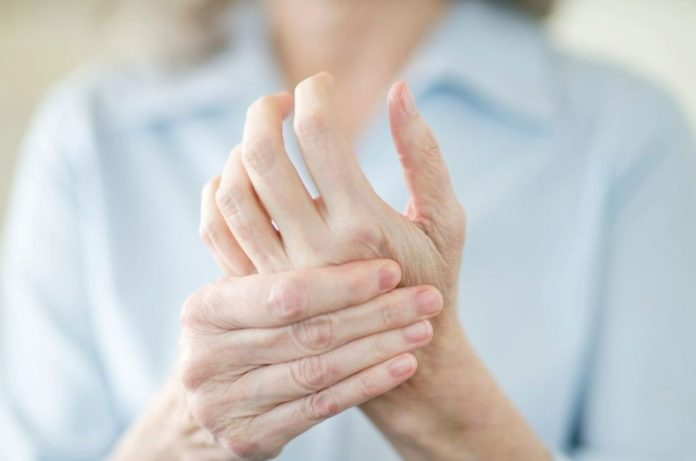It’s common to feel your hands quiver on a first date or while speaking in public, but what if it happens for no apparent reason?
Tremors, which are involuntary muscular contractions that cause shaking movements in the body, are more common in middle-aged and older people, and they usually affect the hands.
They can, however, occur at any time and can be intermittent or continuous.
There are 2 types of tremor: “resting tremor,” which occurs while a person is relaxed, and “action tremor,” which occurs when a person moves their muscles.
How about you? What’s the source of your problem?
Hyperthyroidism or Overactive thyroid
“An overactive thyroid causes the whole system to speed up, feeling like the body is on a high,” according to UK’s Dr. Ruth Handford.
“As a result, the nervous stimuli become excessive, commonly resulting in a hand tremor. This can vary from barely noticeable to very exaggerated, where it’s impossible to carry a cup without spilling the contents.”
If you experience these or other symptoms, such as unexpected weight loss, a quick heartbeat, perspiration, sleeplessness, or anxiety, visit your doctor. They may prescribe hormone replacement medications on a daily basis.
Caffeine overdose
Caffeine might cause our hands to shake due to overstimulation of the neurological system.
“While we all have what’s known as physiologic tremor, an imperceptible shake of the extremities, when the nervous system is overstimulated it can enhance this making the shaking more noticeable. However, this type of shaking is intermittent and doesn’t last for long,” adds pharmacist Abbas Kanani.
If you experience tremors after drinking tea or coffee, reduce or eliminate them from your diet.
Stress
“Stress in the form of anxiety can cause you to shake,” adds Abbas.
“When stress hormones are released, your blood pressure is raised and your heart beats faster. In turn, your muscles become primed to act, causing shaking and tremors. These tremors are temporary and breathing techniques can help.
“Try holding your breath for a few seconds, exhaling slowly. If you’re struggling, speak to your doctor as medication such as propranolol can help reduce tremors associated with anxiety.”
Short of Sleep
“Extreme sleep deprivation over a prolonged period of time affects our neurological reflexes,” explains Abbas.
“However these types of shakes are temporary and will resolve once you’ve had a good rest.”
Make sure you have good sleep hygiene habits, such as sticking to a regular schedule and not using electronic devices before night.
Make sure your room is dark, quiet, and at a pleasant temperature.
MS – Multiple sclerosis
“MS tremors are usually caused by damage to the cerebellum in the brain and the nerves leading to and from it,” according to Dr. Handford.
“This part of the brain controls coordination and balance. An MS tremor can also be the result of a loss of myelin, known as demyelination, in some other areas of the brain that control movement. If your MS tremor is impacting your life, speak to your GP who may recommend talking therapy. This can be particularly useful if anxiety is making your tremor worse.”
May be a symptom of Alcohol withdrawal
“Alcohol has a depressive effect on the central nervous system, slowing down brain activity and reducing energy levels,” says Abbas.
“Over time the body adapts to this by releasing more excitatory neurotransmitters than normal, which increases activity of the nerves, keeping the body alert.
“When alcohol is withdrawn, nerve activity is higher than usual as the brain has adapted and is still working as if alcohol is present, and this can cause tremors. This is temporary, and usually improves
with time.”
If you’re going through withdrawal, make sure you’re being watched by a doctor who can advise you on how to do it safely.
After Stroke
After a stroke, tremors are normal, especially in the hands and arms.
“This is due to small vessel disease of the brain in the areas responsible for voluntary muscle contraction,” adds Dr. Handford.
“Often, tremors as a result of a stroke will resolve on their own within six months but if you’re struggling to cope with them, see your GP who may recommend physical therapy or medication.”
Sign of Parkinson’s disease
Around 80% of patients with Parkinson’s disease exhibit tremors, which can be the disease’s first sign.
“It can appear as a resting tremor or an action tremor,” according to Dr. Handford. “Your doctor might prescribe medication and supportive treatments, such as physiotherapy.
“In some cases, deep-brain stimulation (DBS), where a small current is passed with high frequency through areas of the brain believed to block motor function, can help. It has around a 90% success rate in decreasing or eliminating a Parkinson’s tremor.”
Brain tumour
Although brain tumors are uncommon, a partial seizure, which can cause muscular twitching, is one sign.
“This can spread from the hand or foot and affect up to half of your body,” adds Dr. David Jenkinson, Chief Scientific at The Brain Tumour Charity.
“These focal seizures are very different to a convulsive seizure, where someone may lose consciousness.”
If you’ve experienced a seizure, seek medical attention right away.
How to deal with shaking
Doctors recommend reducing stress, avoiding caffeine, stimulants, and alcohol, and living a balanced lifestyle for non-medical tremors.
Physiotherapy can also help with muscle control, coordination, and strength, which can be beneficial while dealing with the condition.
Medical problems that trigger tremors, such as an overactive thyroid, can be addressed with the appropriate medication.
Otherwise, your doctor may prescribe beta-blockers, anti-seizure medication, sedatives, or even Botox injections.
In severe cases, brain surgery or ultrasound treatment may be recommended.
Image Credit: Getty
You were reading: Doctor reveals what’s causing tremors in your hand
